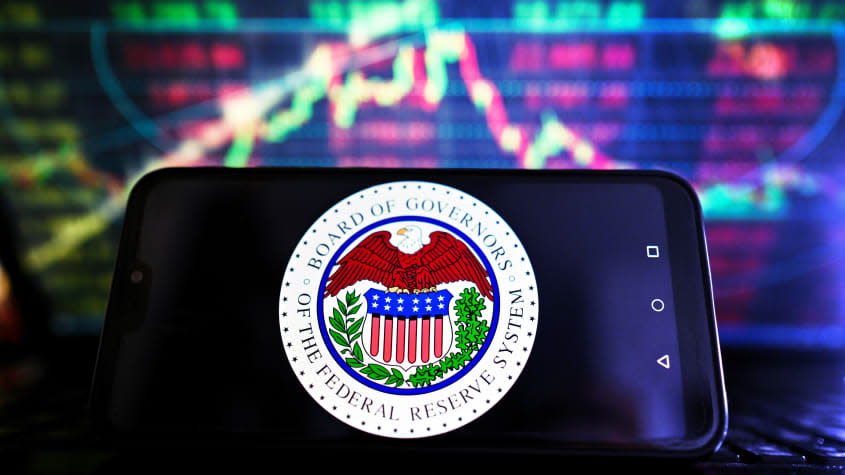Do bank failures mean the Fed should slow its interest rate hikes?

Economic disasters are colliding. The collapse of American banks like Silicon Valley Bank and Signature Bank, and the near-miss with Credit Suisse bank in Switzerland — before USB bought it this week — have sent still-reverberating shock waves throughout the world of finance. Those failures come just as the Federal Reserve meets this week to decide whether to raise interest rates again in its ongoing attempt to rein in still-rampant inflation afflicting the United States and much of the rest of the world.
How are the two related? Economists say the failure of Silicon Valley Bank, for example, was sparked by the Fed's recent rate hikes. While "there's lots of blame to go around," The Washington Post's Abha Bhattarai explains that the rise in rates made investors "more interested in new bonds that promised to pay more," while older bonds with lower rates "became less desirable — and therefore less valuable." A lot of assets in those suddenly-struggling banks were tied up in those older bonds.
That has raised the question of whether the Fed should press ahead with its inflation-fighting rate hikes — or if it should slow down rather than risk tipping over the entire banking system. Goldman Sachs forecasters say they don't expect a rate hike this month, but "few, if any" other Wall Street analysts share that view, CNBC reports. "This is a very tough job," Bloomberg's Michael Mackenzie adds. All eyes will be on the Fed this week, with an eye on how Fed Chairman Jerome Powell tries to find balance "without stirring further concerns — either for financial stability or inflation."
What are commentators saying?
The Washington Post editorial board highlights research showing that 190 banks across the country are at risk of a Silicon Valley Bank-style collapse if their customers lose confidence. That has "triggered concerns about what is next to rupture," the board argues, which is why the Fed should pause rate hikes "to give the financial system time to adjust to the new reality."
Not so fast. "I don't think the Fed has any good options here," economist Tim Duy tells Reuters. "The risk is allowing inflation to become even more embedded versus the risk of aggravating a broader banking crisis." But Reuters points out that the bank failures may help accomplish the Fed's mission of bringing inflation under control: Banking stress probably means a credit contraction is coming — less money will be loaned out to homeowners and businesses, which is less money that they'll spend, which should ease inflationary pressures. "To a degree that is what the Fed wants when it tightens monetary policy, as long as the drop in lending is orderly and doesn't go too far." That might mean the Fed can pause rate hikes without letting inflation run wild. "There's nothing more deflationary than the collapse of a highly-indebted bank," says CNBC's Jim Cramer.
History doesn't offer happy lessons in these situations, however. "When the Fed starts hiking rates, it typically keeps at it until something breaks," Alexander Kurov writes at The Conversation. (The rate hikes of the late 1970s, for example, pushed the American economy into a massive recession before inflation cooled off.) But it's "not so simple" to suggest that the Fed should slow down the rise in interest rates: A slowdown could have the perverse effect of signaling to investors that the broader banking system is more fragile than they thought. Then again: "Increasing rates at a moment like this would mean putting more pressure on a structure that's already under a lot of stress."
What's next for the Fed?
It seems possible we'll get a compromise action this week from the Fed — a rate hike, but not one nearly as big as originally planned. "Many economists expect central bankers to raise interest rates a quarter-point," The New York Times reports, pointing out that "analysts had expected the Fed to make an even bigger rate move" before the bank failures raised questions about the nation's financial stability.
The analysts at Charles Schwab point out that the Federal Reserve has two official mandates — to keep inflation in check and promote full employment. But there's a third, unofficial mandate: "To maintain financial stability." Which is why the Fed will probably slow down its rate-hiking plans. "In times of stress," they write, "financial stability concerns often trump the other two mandates."
You may also like
Russia's spring Ukraine offensive may be winding down amid heavy troop losses, munitions shortages

